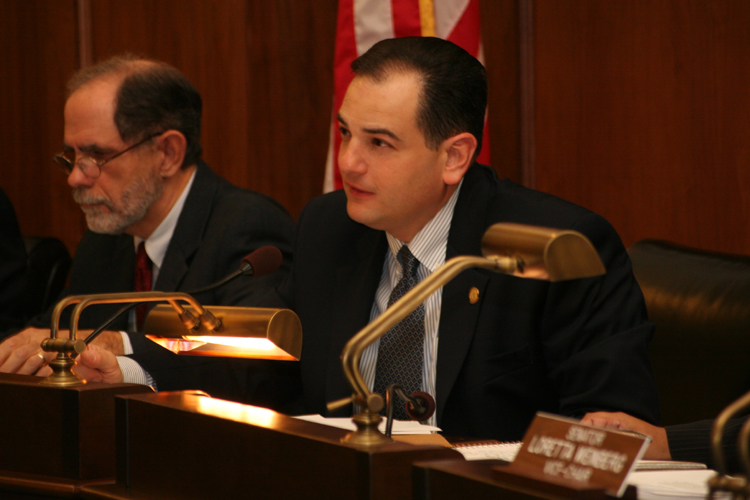
Measure Follows Legalization In Colorado, Washington State
TRENTON – Declaring New Jersey’s laws prohibiting the use and possession of marijuana a failure, Senate Judiciary Chairman Nicholas P. Scutari announced that he will introduce legislation today to legalize, regulate and tax marijuana in New Jersey for those who are 21 years of age and older.
“The drug laws in this country prohibiting the use and possession of marijuana have failed miserably. We have seen billions of dollars spent on enforcement, our streets become increasingly dangerous and the ability of countless people to get a job, go to college or buy a home hindered by criminal records from petty crimes. It is time to update our archaic drug laws and get real about the detrimental effect they are having on our residents’ lives,” said Senator Scutari (D-Union, Somerset and Middlesex). “This bill will create a strictly regulated system that permits adults to purchase and grow limited amounts of marijuana for personal use. It will bring marijuana out of the underground market where it can be controlled, regulated and taxed, just as alcohol has been for decades.”
Senator Scutari said legalizing, regulating and taxing marijuana for those who are age 21 and older could bring in considerable revenue for the state at a time when it is struggling to meet its financial obligations. The states of Washington and Colorado have already implemented marijuana laws. WashingtonState began issuing its first marijuana business licenses this month. Colorado began allowing recreational marijuana sales to adults on Jan. 1. Colorado initially expected to bring in $67 million in tax revenue from marijuana this year, but projections are now as high as $107 million, due to higher-than-anticipated sales. Legalization is also expected to create thousands of jobs in sales, production and related services in that state, a result that could be duplicated in New Jersey.
In addition, the legalization of marijuana would save millions of dollars spent each year on enforcement of the state’s marijuana laws, and it would end discriminatory enforcement – which exists not only in New Jersey but in states across the country. In 2010, New Jersey spent $127.3 million on enforcement, according to a report by the American Civil Liberties Union. The report also found African-Americans are 2.8 times more likely in New Jersey to be arrested for marijuana possession than a Caucasian person, even though the rate of marijuana use is similar.
“As a municipal prosecutor, I have seen the effects of the so-called war on marijuana. We spend over $100 million a year enforcing these failed laws. Our residents are being locked up and carrying permanent criminal records because of arrests from marijuana crimes,” said Senator Scutari, who serves as a municipal prosecutor in Linden. “Legalizing marijuana would allow law enforcement, many of which are contending with limited resources and shrinking manpower, to save millions of dollars each year and to re-dedicate their efforts to the areas where they are most needed. It will take the sale of marijuana off the streets and by doing so make the product and our communities safer. It will also address the detrimental effect that a marijuana arrest can have on someone’s future.”
The Senator’s bill would create a recreational marijuana program in New Jersey that would provide for the licensure of marijuana cultivation, manufacturing and retail facilities. The legislation would permit the possession of up to one ounce of marijuana, and permit the growing of up to six marijuana plants – as long as the growing takes place in an enclosed, locked space and is not made available for sale. The Division of Alcoholic Beverage Control (ABC), which has a proven record of overseeing the manufacture, sale and distribution of alcohol in the state, would be renamed the Division of Alcoholic Beverage and Marijuana Control (ABMC) and be charged with regulating the state’s recreational marijuana program. The division would be required to adopt regulations to implement the program and to begin accepting applications for licenses for marijuana establishments within six months of the bill’s enactment. If it failed to take action within the six-month timeframe, the bill sets up a mechanism for municipalities to operate and oversee the program.
Regardless of which government authority issues licenses, municipalities would be given flexibility to enact local measures governing the operation of marijuana establishments, or prohibiting their operation. Marijuana would be taxed at the statutorily set rate of 7 percent, with 70 percent of revenue going to the Transportation Trust Fund for the construction of transportation projects in the fiscal year the funds are received; 20 percent would be deposited in the Drug Enforcement Demand Reduction Fund for drug counseling, treatment and related programs; and 10 percent would be dedicated to programs addressing women’s health, family planning, postpartum depression awareness, smoking cessation, and HIV-awareness.
“The prohibition of marijuana has been problematic on a number of levels. This is the start of a discussion on creating a common-sense program for regulating marijuana in this state,” said Senator Scutari. “Colorado has successfully implemented its law, creating jobs and generating tax revenue far beyond the state’s expectations. Regulating the sale and consumption of marijuana in New Jersey will not only benefit the state financially, but will mean a safer and more responsible way of treating this drug and a more humane way of treating our residents.”
A copy of the legislation is attached.

